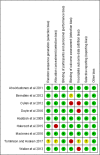Psychological and psychosocial interventions offered to forensic mental health inpatients: a systematic review
- PMID: 30898809
- PMCID: PMC6475151
- DOI: 10.1136/bmjopen-2018-024351
Psychological and psychosocial interventions offered to forensic mental health inpatients: a systematic review
Abstract
Objective: To examine the evidence for the use of psychological and psychosocial interventions offered to forensic mental health inpatients.
Design: CINAHL, MEDLINE, PsycINFO, ScienceDirect and Web of Science databases were searched for research published in English between 1 January 1990 and 31 May 2018.
Outcome measures: Disturbance, mental well-being, quality of life, recovery, violence/risk, satisfaction, seclusion, symptoms, therapeutic relationship and ward environment. There were no limits on the length of follow-up.
Eligibility criteria: We included randomised controlled trial (RCT) studies of any psychological or psychosocial intervention in an inpatient forensic setting. Pilot or feasibility studies were included if an RCT design was used.We restricted our search criteria to inpatients in low, medium and high secure units aged over 18. We focused on interventions considered applicable to most patients residing in forensic mental health settings.
Data extraction and synthesis: Two independent reviewers extracted data and assessed risk of bias.
Results: 17 232 citations were identified with 195 full manuscripts examined in detail. Nine papers were included in the review. The heterogeneity of the identified studies meant that meta-analysis was inappropriate. The results were presented in table form together with a narrative synthesis. Only 7 out of 91 comparisons revealed statistically significant results with no consistent significant findings. The most frequently reported outcomes were violence/risk and symptoms. 61% of the violence/risk comparisons and 79% of the symptom comparisons reported improvements in the intervention groups compared with the control groups.
Conclusions: Current practice is based on limited evidence with no consistent significant findings. This review suggests psychoeducational and psychosocial interventions did not reduce violence/risk, but there is tentative support they may improve symptoms. More RCTs are required with: larger sample sizes, representative populations, standardised outcomes and control group interventions similar in treatment intensity to the intervention.
Prospero registration number: CRD42017067099.
Keywords: forensic; mental health; psychological; psychosocial; systematic review.
© Author(s) (or their employer(s)) 2019. Re-use permitted under CC BY-NC. No commercial re-use. See rights and permissions. Published by BMJ.
Conflict of interest statement
Competing interests: None declared.
Figures
References
-
- Tapp J, Perkins D, Warren F, et al. A critical analysis of clinical evidence from high secure forensic inpatient services. Int J Forensic Ment Health 2013;12:68–82. 10.1080/14999013.2012.760185 - DOI
-
- Barnao M, Ward T. Sailing uncharted seas without a compass: a review of interventions in forensic mental health. Aggress Violent Behav 2015;22:77–86. 10.1016/j.avb.2015.04.009 - DOI
-
- Cavezza C, Aurora M, Ogloff JRP. The effects of an adherence therapy approach in a secure forensic hospital: a randomised controlled trial. J Forens Psychiatry Psychol 2013;24:458–78. 10.1080/14789949.2013.806568 - DOI
Publication types
MeSH terms
LinkOut - more resources
Full Text Sources
Medical


